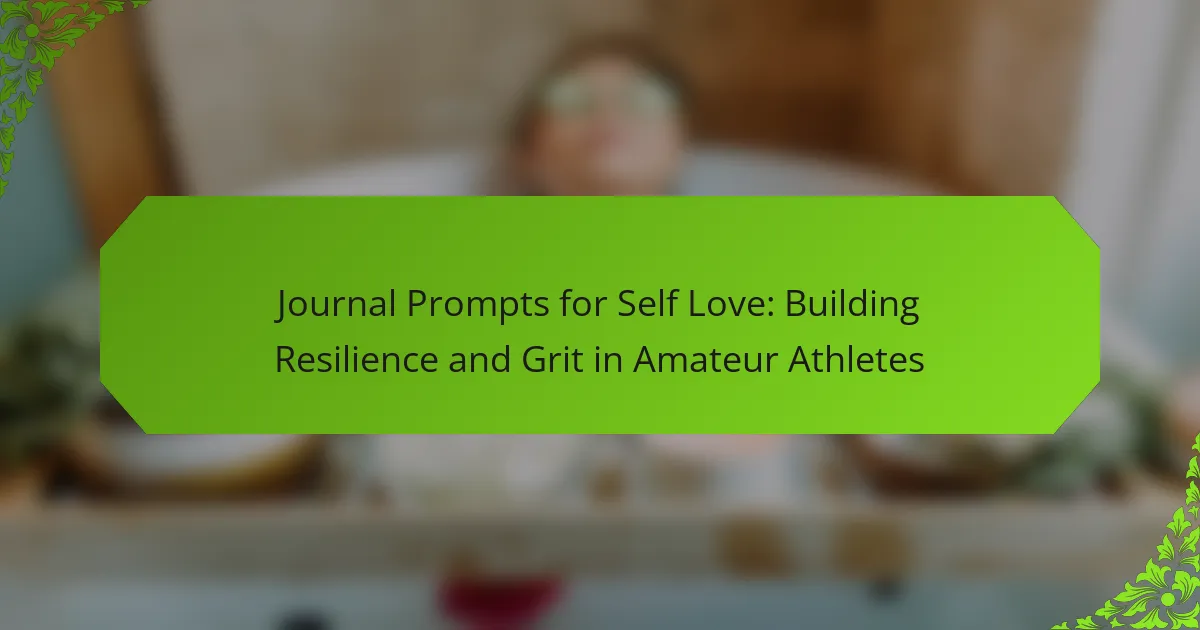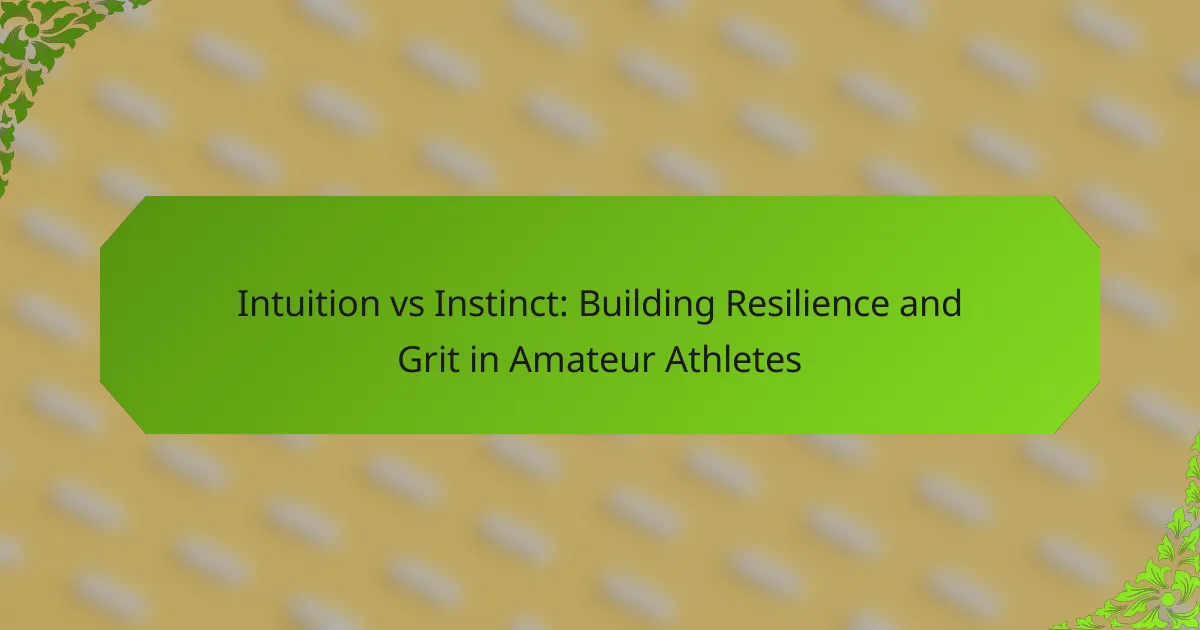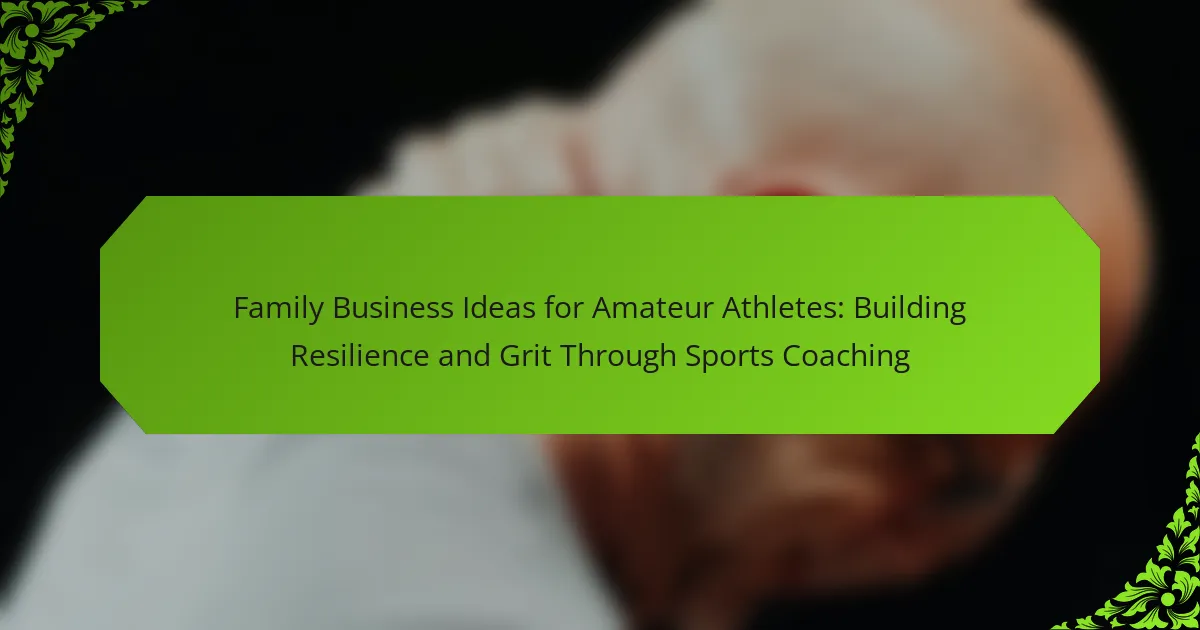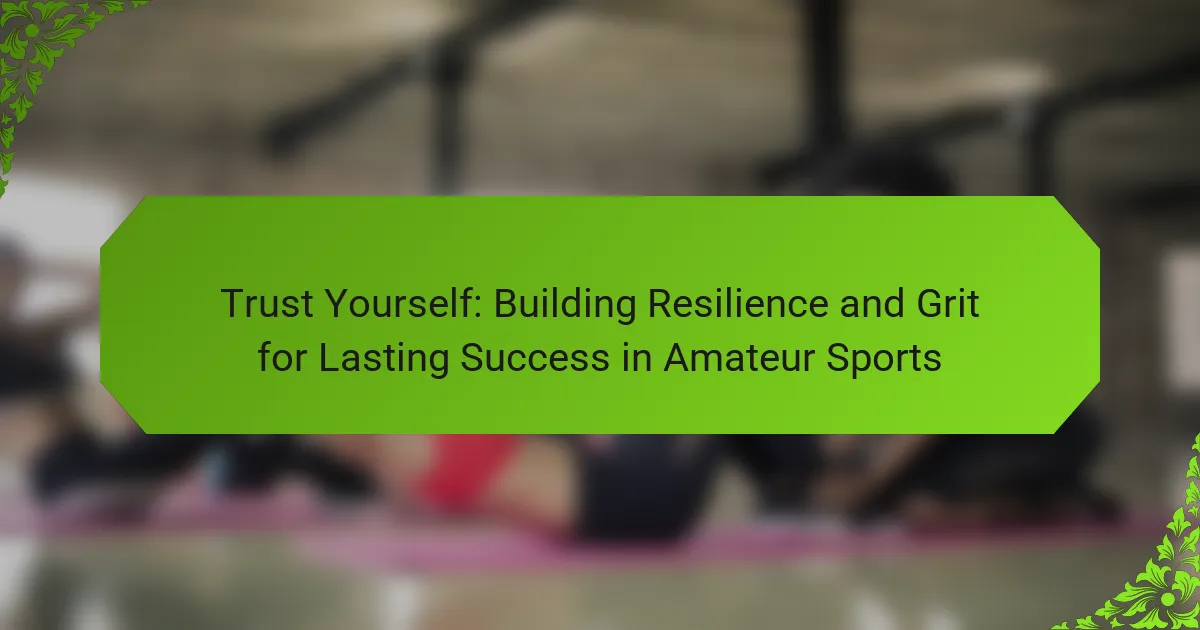Amateur athletes often face challenges that test their motivation and commitment. Cultivating resilience and grit enables them to overcome setbacks and maintain focus on long-term goals. This article explores effective strategies for building a strong mindset, the role of supportive relationships, and the importance of intrinsic motivation. Additionally, it highlights local resources available to enhance mental toughness and foster a love for the sport.

What is Resilience and Grit in Amateur Athletics?
Resilience and grit are essential traits for amateur athletes, enabling them to overcome challenges and maintain motivation. Resilience involves the ability to bounce back from setbacks, while grit refers to sustained passion and perseverance toward long-term goals. Together, these attributes foster a mindset that embraces failure as a learning opportunity, enhancing overall performance and success in sports. Cultivating these qualities can lead to improved mental toughness, allowing athletes to navigate pressures and competition effectively.
How do Resilience and Grit Impact Athletic Performance?
Resilience and grit significantly enhance athletic performance by fostering perseverance and adaptability. Athletes with high levels of resilience can bounce back from setbacks, maintaining motivation and focus. Grit, defined as sustained passion and perseverance, drives athletes to push through challenges, leading to improved training outcomes and competition results. Research indicates that athletes with these traits often outperform their peers, showcasing the importance of mental toughness in sports. Cultivating these attributes through consistent practice and supportive environments can lead to lasting success in amateur athletics.
What are the Common Characteristics of Resilient Amateur Athletes?
Resilient amateur athletes share common characteristics that drive their success. They exhibit mental toughness, adaptability, and a strong work ethic. These traits enable them to overcome challenges and maintain focus on their goals. Additionally, they cultivate a positive mindset, which fosters perseverance and commitment. Effective time management and goal-setting skills also play crucial roles in their resilience.
What Mindsets Foster Resilience in Sports?
A growth mindset fosters resilience in sports by encouraging amateur athletes to embrace challenges and learn from failures. This mindset emphasizes persistence, adaptability, and a focus on improvement. Research shows that athletes with a growth mindset are more likely to overcome setbacks and maintain motivation. They view effort as a path to mastery, which enhances their grit. Cultivating this mindset can lead to lasting success in sports by building emotional strength and commitment.
How Does Grit Influence Long-Term Success?
Grit significantly influences long-term success by fostering resilience in amateur athletes. This quality allows them to persist through challenges and setbacks, ultimately leading to sustained achievement. Research indicates that individuals with high levels of grit are more likely to reach their goals, as they maintain focus and dedication over time. For example, a study found that grit predicts success in various domains, including sports, education, and career advancement. Cultivating grit involves setting long-term goals, embracing challenges, and developing a growth mindset, which collectively enhance an athlete’s ability to endure and thrive.

What Universal Practices Enhance Resilience and Grit?
Cultivating resilience and grit in amateur athletes involves consistent practices that foster a strong mindset. Key practices include setting realistic goals, embracing challenges, and maintaining a positive self-talk. These elements help athletes build confidence and perseverance, essential for long-term success. Engaging in supportive relationships and seeking feedback also enhances resilience, enabling athletes to learn from setbacks. Regular reflection on experiences solidifies lessons learned, further strengthening grit and determination.
How Can Goal Setting Improve Athletic Resilience?
Goal setting enhances athletic resilience by providing clear objectives and a sense of purpose. This focus encourages consistent effort and fosters grit among amateur athletes. Research shows that athletes who set specific, measurable goals experience increased motivation and improved performance. Additionally, goal setting helps athletes navigate challenges by reinforcing a growth mindset, allowing them to view setbacks as opportunities for learning. Ultimately, this practice cultivates a resilient mindset essential for long-term success in sports.
What Role Does Positive Self-Talk Play?
Positive self-talk enhances resilience and grit in amateur athletes by fostering a supportive mental environment. It encourages a growth mindset, enabling athletes to overcome challenges and setbacks. Research indicates that positive self-talk can improve performance and reduce anxiety, ultimately leading to lasting success. By framing challenges as opportunities, athletes develop a unique attribute of perseverance, essential for achieving their goals.
How Can Visualization Techniques Strengthen Grit?
Visualization techniques can significantly enhance grit by fostering mental resilience and focus. These methods allow amateur athletes to mentally rehearse their goals, reinforcing perseverance through challenging situations. Engaging in visualization strengthens neural pathways associated with determination, making it easier to overcome obstacles. As a result, athletes develop a more robust mindset, crucial for long-term success.

What Unique Strategies Cultivate Grit in Amateur Athletes?
Amateur athletes can cultivate grit through strategies that emphasize intrinsic motivation, consistent practice, and supportive environments. Fostering a love for the sport without external expectations encourages resilience.
One effective strategy is setting personal goals that focus on improvement rather than competition. This unique attribute promotes a growth mindset, allowing athletes to embrace challenges. Another approach is incorporating mental training techniques, such as visualization and positive self-talk, which enhance mental toughness.
Creating a community of support among peers also plays a crucial role. This environment encourages athletes to share experiences and learn from one another, reinforcing their commitment to the sport. Lastly, celebrating small achievements helps build confidence and perseverance, essential components of grit.
How Does Embracing Failure Build Resilience?
Embracing failure fosters resilience by teaching athletes to adapt and persevere. This process builds grit, enabling them to face challenges confidently. Failure provides valuable lessons, encouraging a growth mindset. Athletes learn to analyze setbacks, improving their strategies for future success. Resilience developed through failure ultimately leads to lasting achievement in sports and life.
What Are the Benefits of a Supportive Community?
A supportive community fosters resilience and grit in amateur athletes by providing emotional encouragement and practical resources. These benefits include enhanced motivation, reduced stress, and a sense of belonging. Athletes thrive in environments where they receive constructive feedback and shared experiences, which can significantly improve their performance. Studies show that athletes with strong community ties are more likely to persist through challenges, leading to sustained success.
How Can Journaling Enhance Grit and Reflection?
Journaling enhances grit and reflection by fostering self-awareness and resilience in amateur athletes. It allows them to track progress, identify challenges, and develop strategies for improvement. Regular writing cultivates a growth mindset, reinforcing perseverance through setbacks. Studies show that athletes who journal report increased motivation and clarity in their goals, contributing to lasting success.

What Rare Attributes Contribute to Lasting Success?
Rare attributes that contribute to lasting success in amateur athletes include intrinsic motivation, adaptability, and emotional intelligence. These qualities foster resilience and grit, enabling athletes to overcome challenges. Intrinsic motivation drives passion for the sport, while adaptability allows for effective responses to changing circumstances. Emotional intelligence enhances interpersonal relationships, creating a supportive environment. Together, these rare attributes cultivate a mindset essential for sustained achievement in athletics.
How Can Emotional Intelligence Influence Resilience?
Emotional intelligence significantly enhances resilience in amateur athletes by fostering self-awareness and emotional regulation. This ability enables athletes to manage stress and recover from setbacks effectively. For instance, athletes with high emotional intelligence can maintain focus during competitions, leading to improved performance and grit. Research indicates that emotionally intelligent individuals are better equipped to handle challenges, facilitating a growth mindset essential for long-term success. Cultivating emotional intelligence thus becomes a unique attribute that not only supports resilience but also contributes to lasting achievement in sports.
What is the Impact of Adaptive Thinking on Grit?
Adaptive thinking significantly enhances grit by fostering resilience in amateur athletes. This mental flexibility allows them to navigate challenges and setbacks effectively, promoting a growth mindset. As a result, athletes develop persistence and determination, essential for long-term success. Adaptive thinkers are more likely to embrace failures as learning opportunities, reinforcing their commitment to improvement. This unique attribute of adaptive thinking cultivates a deeper emotional investment in their sport, leading to sustained grit and achievement.
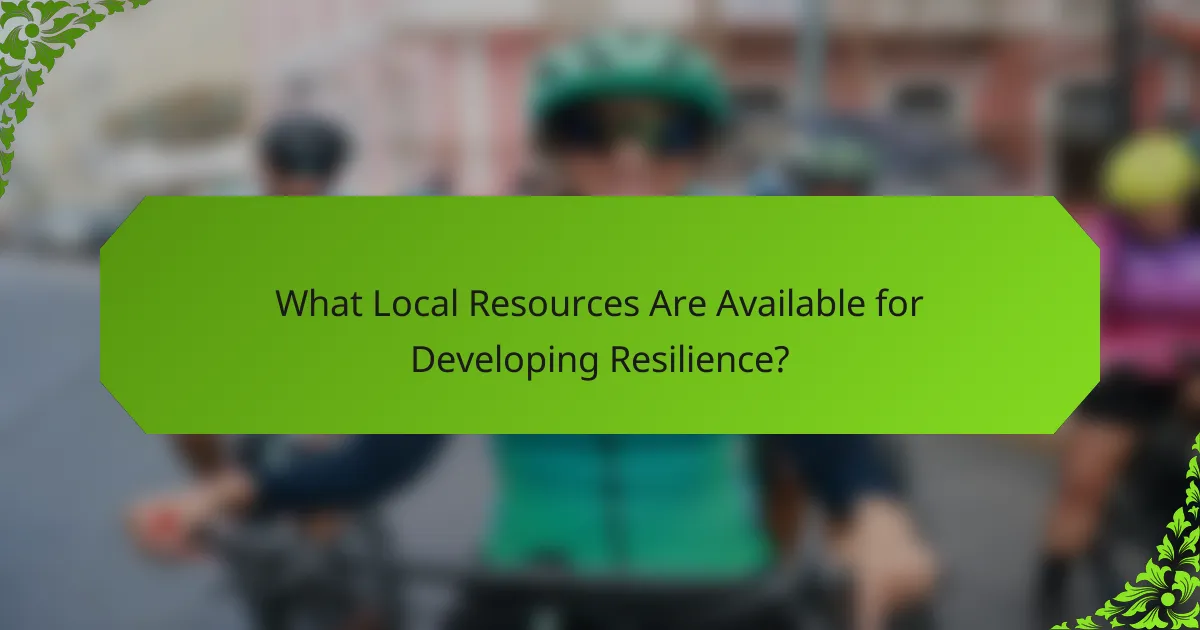
What Local Resources Are Available for Developing Resilience?
Local resources for developing resilience in amateur athletes include community sports programs, mental health workshops, and mentorship opportunities. These resources provide essential support for cultivating grit and perseverance. Community centers often host training sessions focused on resilience-building techniques. Schools may offer access to sports psychologists who can guide athletes in managing stress and setbacks. Local clubs frequently organize group activities that foster teamwork and camaraderie, enhancing emotional resilience. Engaging with these resources contributes significantly to long-term success in sports.
How Can Community Programs Support Amateur Athletes?
Community programs can significantly support amateur athletes by fostering resilience and grit. These initiatives provide structured environments where athletes learn essential life skills, such as teamwork and perseverance.
Programs often offer mentorship opportunities, connecting athletes with experienced coaches and role models. This guidance helps athletes navigate challenges, building their mental toughness.
Additionally, community support through resources like training facilities and workshops enhances athletes’ skills. Programs may also facilitate competitions, giving athletes valuable experience and exposure.
Finally, a strong community network fosters emotional support, encouraging athletes to pursue their goals despite setbacks. This holistic approach cultivates lasting success in amateur athletes.
What Workshops Focus on Grit and Resilience Skills?
Workshops focusing on grit and resilience skills for amateur athletes include programs that emphasize mental toughness and emotional endurance. These workshops often incorporate practical exercises, group discussions, and personal reflection to cultivate these essential skills.
Examples of such workshops are:
– “Resilience Training for Athletes”
– “Grit Development through Sports Psychology”
– “Mindset Mastery for Lasting Athletic Success”
– “Overcoming Adversity in Sports”
– “Building Grit: A Workshop for Young Athletes”
– “Resilience and Performance Enhancement Seminar”
These workshops aim to equip athletes with the tools to face challenges and maintain motivation.

What Best Practices Can Athletes Implement Immediately?
Athletes can implement several best practices immediately to cultivate resilience and grit. Focus on setting realistic goals, maintaining a positive mindset, and embracing challenges.
1. Set Specific Goals: Define clear, achievable objectives to guide training and performance.
2. Practice Mindfulness: Incorporate mindfulness techniques to enhance focus and reduce stress.
3. Embrace Failure: View setbacks as learning opportunities to build resilience.
4. Develop a Support Network: Surround yourself with supportive coaches and peers for motivation.
5. Prioritize Recovery: Implement proper recovery strategies to sustain performance and prevent burnout.
What Common Mistakes Should Amateur Athletes Avoid?
Amateur athletes should avoid overtraining, neglecting nutrition, ignoring recovery, setting unrealistic goals, and comparing themselves to others. These mistakes hinder resilience and grit, essential for lasting success. Overtraining leads to burnout and injuries, while poor nutrition affects performance. Recovery time is crucial for physical and mental health. Unrealistic goals can cause frustration, and constant comparisons can erode confidence. Focusing on personal progress fosters a healthier mindset.
How Can Athletes Optimize Their Training for Resilience?
Athletes can optimize their training for resilience by integrating mental strategies, physical conditioning, and recovery techniques. Focus on building a growth mindset that embraces challenges and setbacks as opportunities for development. Implement consistent training routines that emphasize both strength and endurance, adapting to individual needs. Prioritize recovery through adequate sleep, nutrition, and active rest days to enhance overall resilience. Incorporate mindfulness practices to improve mental toughness and emotional regulation.
What Expert Insights Should Athletes Consider for Growth?
Athletes should focus on resilience and grit to achieve lasting success. Cultivating these traits fosters mental toughness and adaptability during challenges. Research indicates that resilience can enhance performance under pressure, while grit correlates with long-term achievement. Athletes should engage in consistent practice, seek constructive feedback, and embrace setbacks as learning opportunities. These strategies build a robust mindset, essential for navigating the ups and downs of athletic journeys.
